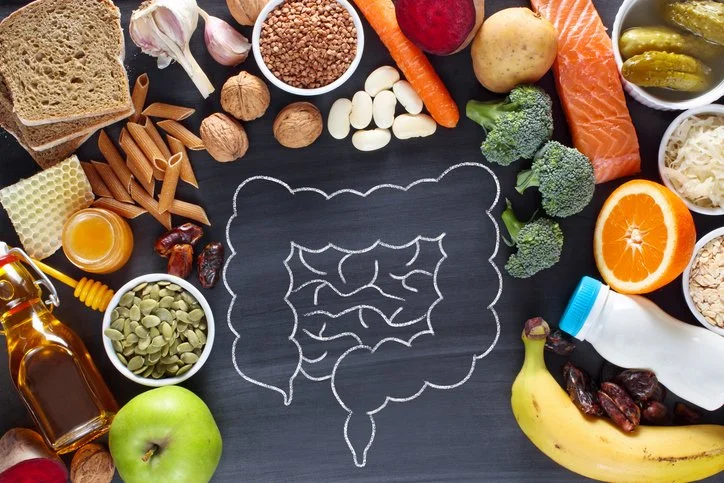What is IBS?
Irritable bowel syndrome (IBS) is a medical term used to describe a collection of gut symptoms.
Symptoms can vary in severity from one person to another, and it may be constipation or diarrhoea dominant, or a combination of both.
When should I consider being Assessed for IBS?
An IBS assessment should be considered if you have had any of the following symptoms for at least six months: abdominal pain or discomfort, bloating, or change in bowel habit.
A diagnosis of IBS should be considered only if there is abdominal pain or discomfort that is either relieved by defaecation or associated with a change in bowel habit. This should be accompanied by at least two of the following four symptoms:
Altered stool passage (straining, urgency, incomplete evacuation)
Abdominal bloating (more common in women than men), distension, tension or hardness
Symptoms made worse by eating
Passage of mucus
Other features such as lethargy, nausea, backache, and bladder symptoms are common in people with IBS. It is important to have a diagnosis of IBS confirmed and other conditions such as coeliac disease and inflammatory bowel disease ruled out. If you think you may be suffering with IBS, but also have any of the following symptoms, see your doctor to discuss whether further investigation may be required:
Unintentional and unexplained weight loss
Rectal bleeding
A family history of bowel or ovarian cancer or coeliac disease
A change in bowel habit to looser and/or more frequent stools persisting for more than six weeks in a person aged over 60 years
IBS vs IBD: Know the difference
Note that IBS is not the same as IBD (Irritable Bowel Disease). IBD is a group of autoimmune diseases that includes Crohn’s Disease and Ulcerative Colitis. With IBD, the immune system mistakenly attacks your body, which causes cause chronic or acute inflammation.
Managing Symptoms of IBS
Some general advice around managing IBS is as follows;
Eat three regular meals a day.
Try not to skip any meals or eat late at night.
Eat smaller sized meals that are easier to digest.
Take time when eating and chew food well. Digestion starts in the mouth and the better broken down your food is going into our oesophagus, the better it is for digestion. Take some time after your meal to relax and allow your body to start digesting your meal.
Limit alcohol intake.
Reduce intake of caffeine-containing drinks.
Reduce intake of fizzy drinks.
Cut down on rich or fatty/fried foods such as chips, fast foods, ready meals and sauces, pies, samosas, batter, cheese, pizza, spring rolls, creamy sauces, snacks such as crisps, chocolate, cake and biscuits, spreads and cooking oils, and fatty meats such as burgers and sausages.
Other helpful strategies to ease symptoms include:
Take time to relax – Stress management techniques such as mindfulness/meditation, yoga, aromatherapy or massage may help, as we know there is a significant link between IBS and stress.
Exercise regularly; try walking, cycling, swimming, etc.
Keep a food and symptom diary whilst you are making changes so you can see what has helped.
Make one change at a time so that you can see what has helped and identify any potential triggers, and, remember, these triggers may look different for everyone.
Fermented dairy & probiotics
You may wish to try yoghurt, a fermented milk drink such as kefir, or a probiotic supplement to help your IBS.
If using a probiotic supplement, try one at a time and take it daily for at least four weeks to see if your symptoms improve. If it does not appear to help then you could then try an alternative brand. It is advised to get guidance from a registered dietitian or your healthcare provider when doing so.
Further advice
Give your bowels time to adjust to any changes. If your symptoms persist after following general lifestyle and dietary advice, ask your doctor to refer you to a healthcare professional with expertise in dietary management, who can ensure your diet is nutritionally adequate whilst following a dietary intervention, e.g. a dietitian. They may suggest that you trial a diet restricted in fermentable carbohydrates (also known as a low FODMAP diet). Please note this diet should not be started without the supervision of a dietitian.
Quick tips for IBS
It is important to have a diagnosis of IBS confirmed and other conditions such as coeliac disease and inflammatory bowel disease ruled out so that appropriate treatment can be advised.
Try simple dietary changes first, as you may find that major changes are not needed.
Aim for regular, healthy, balanced meals.
Limit alcohol, caffeine, and fizzy drinks.
Take time to eat in a calm environment, chewing food well.
Take time to relax.
Keeping a food and symptom diary can help you to monitor the effect of any changes.
Make changes according to your symptoms.
If you try probiotics, probiotic yogurt or fermented milk drink, try one product at a time for at least four weeks.
Seek specialist advice if you are struggling or your dietary intake becomes limited.
19th April is World IBS Day - find out more here.
Find out more about our IBS services here.
References
National Institute for Health and Clinical Excellence. Irritable bowel syndrome in adults. Diagnosis and management of irritable bowel syndrome in primary care. Clinical guideline 61 Update 2017 [04/04/2017]. Available from: http://www.nice.org.uk/Guidance/CG61
McKenzie, Y. A., Bowyer, R. K., Leach, H., Gulia, P., Horobin, J., O'Sullivan, N. A., ... & Thompson, J. (2016). British Dietetic Association systematic review and evidence‐based practice guidelines for the dietary management of irritable bowel syndrome in adults (2016 update). Journal of Human Nutrition and Dietetics, 29(5), 549-575.
McKenzie Y.A., Thompson J., Gulia P. & Lomer M.C.E. (2016) British Dietetic Association systematic review of systematic reviews and evidence-based practice guidelines for the use of probiotics in the management of irritable bowel syndrome in adults (2016 update). J Hum Nutr Diet. 29, 576–592.
Public Health England in association with the Welsh Government FSSatFSAiNI. The Eatwell Guide. Public Health England, 2016 Contract No.: 9 August 2016.
Palsson OS, Ballou S (2020) Hypnosis and cognitive behavioural therapies for the management of gastrointestinal disorders; Curr Gastroenterol Rep. 3;22(7):31



